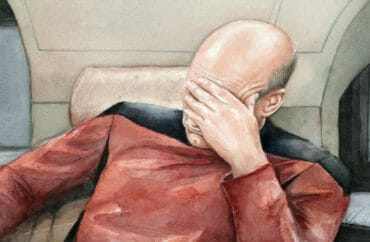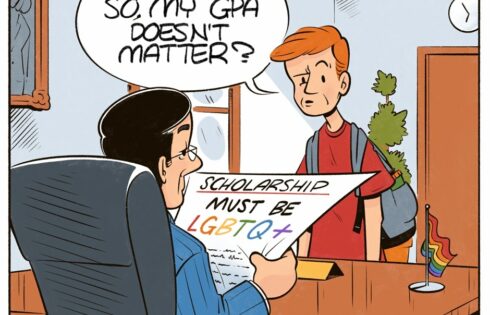
The top librarian at MIT recently argued that to make tech workplaces more inclusive and welcoming to women, ditch “Star Trek” posters and other geeky stuff cluttering office walls.
“There is research that shows that workplaces that are plastered with stereotypically ‘tech or nerd guy’ cultural images – think Star Trek – have negative impact on women’s likelihood of pursuing tech work and of staying in tech work in general or in that particular work environment,” said Chris Bourg, director of libraries at the Massachusetts Institute of Technology.
“Replace the Star Trek posters with travel posters, don’t name your projects or your printers or your domains after only male figures from Greek mythology, and just generally avoid geek references and inside nerd jokes,” Bourg added. “Those kinds of things reinforce the stereotypes about who does tech; and that stereotype is the male nerd stereotype.”
Bourg made the comments during her recent keynote address to the code{4}lib convention in Washington D.C, according to a post on her blog.
Since the many incarnations of “Star Trek” are considered some of the most diverse shows in the history of television, not to mention that about half those attending Star Trek conventions are female, The College Fix contacted Bourg about this particular reference.
She responded by pointing out her advice “comes directly from the research,” and provided a link to the study: “Ambient Belonging: How Stereotypical Cues Impact Gender Participation in Computer Science.”
The 2009 study examined whether “stereotypical objects” like Star Trek posters “signal a masculinity that precludes women from ever developing an interest in computer science.” Or, as the authors dub it, how the “ambient belonging” of women is affected by tech-geek ware.
While conceding that the tech-geek “masculinity” in question may not refer to a “traditional definition” (think “strength, assertiveness, and sexual prowess”) the authors argue the “stereotypicality” of the group still has a “profound” effect on the ability to recruit people who do not see themselves as fitting that stereotype.
Although those working in the computer science field contend contemporary stereotypes of the field “are highly exaggerated and inaccurate,” computer scientists, “whether they are men or women who embody the stereotypes of their field (e.g., liking science fiction, obsessed with computers) may be less effective at recruiting women to computer science than other men and women who defy these stereotypes,” the study says.
To maintain this adequate “ambient belonging,” the study suggests, instead of hanging objects like Star Trek posters, fill an environment with things like “nature posters, art [and] general purpose books and magazines” (and, as Bourg suggests, travel posters).
Bourg, a self-described “butch and queer” cis woman and “feral librarian” who’s been “misidentified too many times to ignore,” noted she wants to bring to librarianship “a sociological lens and a feminist perspective.”
“The work of libraries and librarians can do more than just support feminist research and agendas. We can play a critical role in supporting the causes of inclusion, plurality, participation and transparency,” according to a 2015 paper Bourg co-authored.
In her recent keynote address, she put in perspective how important the issue is by citing the work of a peer:
[…] he implored us to recognize that “A profession that is 88% white means 5000% agony for people of color, no matter how liberal and enlightened you think you are.” He also said we need to have “a fucking reckoning” about the pain we cause, and that we need to do some hard work on decolonizing our organizations and our professions.
To help combat “subtle forms” of stereotyping and discrimination in tech fields, one of the things Bourg advises is for men and white people to cease “mansplaining” and “whitesplaining,” respectively.
“Just stop,” she argued. “Stop doing it in person, and stop doing it online.”
What I mean is simply this — if you have some power and privilege in a situation (and if you are white and/or a dude, chances are you do have some privilege; if you are a white dude, you definitely have power and privilege), then for the love of baby unicorns please refrain from giving your unsolicited advice and opinions to others.
In addition, Bourg proposed tech workplace improvements such as (white men) “vouching” for members of marginalized communities (“Hey Tom, have you met my colleague Safiya? She is an expert on algorithmic bias in search engines, and has just published a book based on years of research”) and avoiding clique-ish behavior.
According to its website, code{4}lib is a “volunteer-driven collective of hackers, designers, architects, curators, catalogers, artists and instigators from around the world, who largely work for and with libraries, archives and museums on technology ‘stuff.'”
MORE: Learning history and culture via Star Trek
MORE: Profs get grant to overcome white male hegemony in science fiction
IMAGE: Twitter
Like The College Fix on Facebook / Follow us on Twitter





Please join the conversation about our stories on Facebook, Twitter, Instagram, Reddit, MeWe, Rumble, Gab, Minds and Gettr.